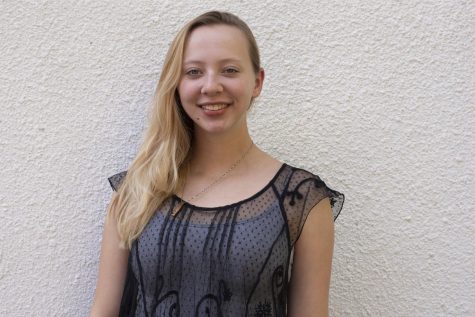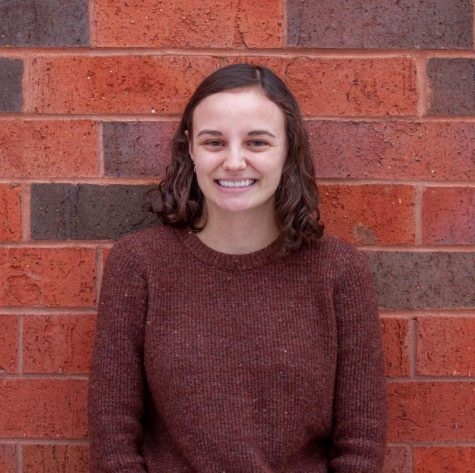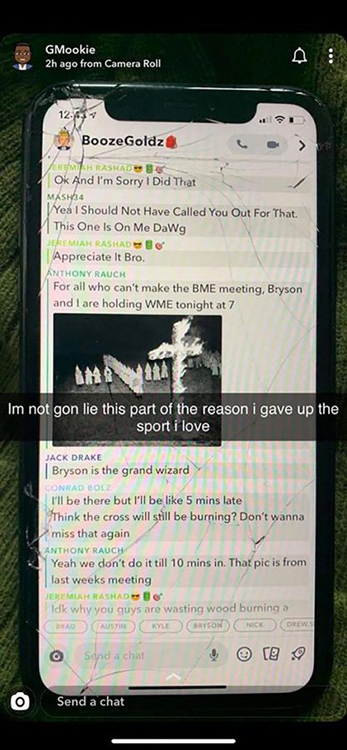‘Strong majority’ of Blugold football team opposed to university-ordered reinstatement of five suspended players
Athletes involved in racist incident last year set to rejoin football team
Photo by Submitted
This image of a Snapchat group chat depicts a racist interaction between UW-Eau Claire football players that was released in November 2019.
Chancellor James C. Schmidt is accepting a review panel’s finding that five members of the Blugold football team did not violate system policy when they sent racist snapchat messages and is allowing reinstatement following their suspension last fall amid a campus-wide protest.
Members of the Blugold football team are calling the university decision to reinstate the players unjust and a violation of Student-Athlete Handbook policy.
“We are standing for what is right, while the university is allowing racism to exist within our teams,” said Jonathan Malueg, captain of the football team. “As a football team we know that to get to the root we cannot allow these five individuals back onto our team.”
University administrators and athletic department staff had been largely silent on the outcome of a months-long investigation that involved UW System lawyers, prompted two task forces and heightened efforts to assure equity, inclusivity and diversity on campus. Schmidt refused requests to meet with team members, according to players. He also refused to meet with campus reporters this week but agreed to provide a statement after The Spectator announced plans to publish its investigation.
That statement was sent to the university community at 6:22 p.m. Tuesday, Sept. 22.
Schmidt said the panel consisted of faculty, staff and students. The statement did not say when the panel released its findings.
The statement contained comments from the chancellor, Vice Chancellor for EDI and Student Affairs Warren Anderson, Athletic Director Dan Schumacher and Head Football Coach Wesley Beschorner. The Spectator had requested interviews with all parties, but none were granted.
While all four denounced the players’ actions, they urged team members and the university community to move forward.
“I have always respected and followed the policies and procedures of the University,” Schumacher said. “The actions of five student-athletes was unacceptable and destructive to our football program, athletic department and university. It is a privilege, not a right, to be a college student-athlete. We must move forward, must learn from it, become stronger for it.”
Still, members of the team, the UW-Eau Claire Student-Athlete Advisory Committee and a former Black Male Empowerment member are saying the university has violated student athletic policy by forcing players to reinstate their former teammates.
Anthony Rauch, Conrad Bolz, Jeremiah Crisostomo, Oscar Gonzalez and Jack Drake were temporarily removed from the team after a screenshot of a Snapchat conversation between the five was released last November.
The racist snapchat conversation first surfaced on Nov. 20, 2019, and featured the photo of a burning cross, likening a football team meeting to that of a Ku Klux Klan gathering. The athletes were subsequently suspended from the team.
The statement provides no indication that the university is requiring any apology on the part of the players.The chancellor noted that restorative justice will be a part of future discussions but fell short of saying the players will be required to participate in such activities. None of the five athletes responded to Spectator requests for interviews.
The team learned from their coaches last week that the suspended players had their suspensions overturned, and would be reinstated. It wasn’t until after players talked to The Spectator and staff began reporting that Schmidt and his administration decided to provide a public explanation of the UW System investigation and the university’s decision to reinstate players.
While the football season is suspended because of COVID-19 concerns, players are participating in team building activities and training practices.
Malueg sent an email to university coaches on Friday, Sept. 18, expressing what he termed a “strong majority” of the team’s dissatisfaction with the university’s decision.
In the email, Malueg cited the Student-Athlete Handbook, which states under the section titled “Policy Statement on Bias Incidents, Hate Acts, Hate Crimes, Discrimination, Harassment and Hazing” that “all conduct consequences, including suspension or dismissal, from a team, is at the discretion of the Head Coach and Director of Athletics.”
However, Malueg said, the judicial appeal process was carried out entirely by university administration, rather than the athletics department.
When the five suspended athletes made an appeal to have their suspensions overturned, the UW System ultimately chose whether or not the players were reinstated, Malueg said, which meant the athletic director and coaches were not a part of the decision making process, as handbook policy requires.
The Spectator has requested, but not yet been provided access to the UW System’s final report on the matter.
Director of Athletics Dan Schumacher said he was unaware of the email Malueg sent when a Spectator reporter called to ask him about it. He declined any further comment.
Wesley Beschorner, head football coach, also declined to comment on the email. In the university’s prepared statement, he said:
“Based on the outcome of the judicial process, these five men will be allowed back on the team roster. We have strongly urged them to participate in restorative justice activities if they want to truly be part of our team. We are committed to fighting racism through education and action.”
Malueg said in his email that Vice Chancellor Warren Anderson had an online meeting with Drew Schrader — another football player — Beschorner, Schumacher and himself after coaches told them the players were going to be reinstated.
Malueg also sent a statement to The Spectator on behalf of the team — saying all but a “handful” of players opposed the reinstatement.
“We have discussed this as a team, and we came to the conclusion that what the five individuals did was wrong,” Malueg wrote in the statement. “We tried to tell the administration numerous times that we do not want them back on our team but are being ignored.”
Four upperclassmen representatives from the football team agreed to interviews under the condition of anonymity to present a unified front.
“We, as a team, do not agree with the statements that were said in that group chat,” one player said. “That’s not something that we stand with, and we hold our team and our players to a higher standard … It shouldn’t be tolerated within our team to say something along those lines or joke about something like that.”
Another player said Anderson admitted there was a flaw in the university’s handling of the incident.
“I don’t think they want people to know that they made an error in the process,” he said. “They’re kind of keeping that low-key. We’ve heard that from Vice Chancellor Warren Anderson that there was a mistake in the process, but they’re not going to share that publicly. That error in the process is why we’re talking today.”
Anderson did not respond to The Spectator’s phone and email requests for comment, but said in the university statement he “reached out to the co-captains of the football team to invite them to … build a legacy of forgiveness and accountability.”
In response to the initial incident, members of Black Male Empowerment organized a silent walkout Nov. 26, 2019. Hundreds from the UW-Eau Claire community gathered to protest and present a list of BME demands to Schmidt, requesting “institutional transparency” and the removal of coaches and students taking part in “a culture of racism and bias in the athletic department.”
At the walkout, Schmidt addressed the crowd, his voice filled with emotion.
“You give me hope as a campus (that) we can make good on our diversity statements that we’ve had for decades,” Schmidt said. “You should expect transparency from us. You should expect action from us.”
Ten months later, in a university statement prompted by The Spectator investigation, Schmidt said:
“I know we are – and can – be better. The football team faces the hard work of rebuilding trust; the faculty, staff and students of this university must take on that challenge. I will continue to work with the entire community to ensure that this incident is the exception, and not the norm.”
But critics of the administration’s handling of the incident say the university has not been transparent. One team member said there has been a lack of communication from campus administration regarding the reinstatement of the players.
“People deserve to know if the university is going to make decisions this poorly,” he said. “They’re not telling people really anything about the situation. The people that were affected, especially, don’t know. They just don’t want to answer any questions and have people think it’s a football decision.”
Mackenzie Bachmann, president of the university’s SAAC, confirmed that the SAAC plans on releasing a statement supporting Malueg and the rest of the team.
Kendall McGinnis, a recent UW-Eau Claire graduate, football player and BME member, went public with the Snapchat conversation last November. After learning of the reinstatement from a Spectator reporter, McGinnis said the university has failed its students, athletic department and community.
“The university talks about how much they want diversity, but does the minimum for minorities,” he said. “As a former member/president of BME when it all first happened, all that we asked for was justice and the university promised us there would be a thorough investigation.”
McGinnis said the decision to allow Rauch, Bolz, Crisostomo, Gonzalez and Drake back on the team isn’t justice. He said this decision shows that the university tolerates racism on its campus and in its community.
Fuerstenberg can be reached at [email protected].
Kopke can be reached at [email protected].
Van Sistine can be reached at [email protected].

Madeline Fuerstenberg is a fourth-year journalism student. This is her eighth semester on The Spectator staff and she’ll miss it with all her heart once she graduates (if she graduates).

Lea Kopke is a fourth-year journalism and German student. This is her seventh semester on The Spectator staff. She plays the clarinet in the Blugold Marching Band and recently relearned how to ride a bike with no hands.

Ta’Leah Van Sistine is a fourth-year journalism and creative writing student. This is her seventh semester on The Spectator staff. She is spending the semester at Queens College in New York City. When she is not reporting for The Spectator or Blugold Radio Sunday, she enjoys getting lost in a good book or a national park.


Jackie • Sep 23, 2020 at 9:23 pm
Whatever happened to forgiveness. Give the players a chance to say sorry.